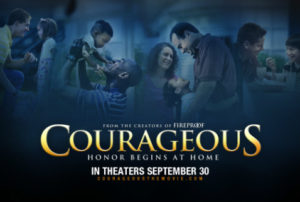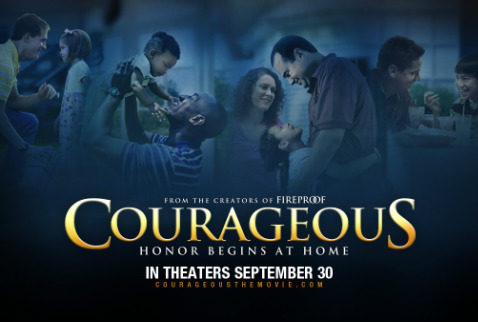A Look At Family Friendly Fiction
 While Brian Godawa is giving us an excellent apologetic for what many consider the opposite of “family friendly” films — horror — we have also been discussing the movie Courageous which released September 30 in a limited number of theaters. Interestingly this movie experienced, according to CBN News, startling success (Hollywood starts paying attention when something earns money against all odds) and it is “family friendly.”
While Brian Godawa is giving us an excellent apologetic for what many consider the opposite of “family friendly” films — horror — we have also been discussing the movie Courageous which released September 30 in a limited number of theaters. Interestingly this movie experienced, according to CBN News, startling success (Hollywood starts paying attention when something earns money against all odds) and it is “family friendly.”
What makes fiction “family friendly”?
Not many people seem interested in defining the term, perhaps because it seems self-evident: the whole family can watch the film or read the book. That would suggest there is no sexual innuendo, no graphic violence, no language inappropriate for the youngest members of the family. Undoubtedly there isn’t any drinking or smoking or gambling, either. I’d imagine there is no drug activity, and certainly no physical abuse. The list could go on.
But what about ideas? Are anti-God ideas family friendly? How about idol worship? Or humanism? Who exactly is to say what ideas are family friendly and which are not?
My thinking is that the ideas are much more significant, probably more subtle, but more lasting than the externals some people apparently use to judge whether or not a movie or book is family friendly.
Paul Jankowski, author of How to Speak American: Building Brands in the New Heartland, recently published “Family Friendly Movies Make Big Money: Hollywood Noticing” on the subject. In his article he references movies with Christian subject matter, others that “are sneaking faith-based messaging and values into films,” and still others he called “family friendly.”
Unfortunately, the term “family friendly” has become entwined with the idea of “safe.” But safe from what? What is it that can do eternal damage to a soul?
I just read, for example, a review of The Lion King at Focus on the Family’s Plugged In Online movie review site. While I consider this film a gateway into New Age thought or neo-Hinduism, Focus found “insightful spiritual components.” In addition, the review gave no warning that there might be ideas in the movie — apart from those that are rejected or defeated — that contradict Biblical truth. Apparently, then, this movie, according to this evaluation, is “family friendly,” and presumably “safe.”
The value of “family friendly” stories.
While I think we would be wise to divorce the idea of “family friendly” with the idea of “safe,” I think we could — and probably should — categorize family friendly stories as “clean.”
 There are any number of moral values that Christians share with others in our culture, and it’s right for us to encourage the propagation of those values — not as a means of salvation or as a primary focus over proclaiming Christ, but as a part of “soil preparation.” I wonder if Christians have been so focused in the last fifty years in sowing seed — the word of God — that we’ve neglected the main point of Jesus’s parable. The critical factor that insured much fruit was what kind of soil the seed fell on.
There are any number of moral values that Christians share with others in our culture, and it’s right for us to encourage the propagation of those values — not as a means of salvation or as a primary focus over proclaiming Christ, but as a part of “soil preparation.” I wonder if Christians have been so focused in the last fifty years in sowing seed — the word of God — that we’ve neglected the main point of Jesus’s parable. The critical factor that insured much fruit was what kind of soil the seed fell on.
Anyone who knows the smallest bit about gardening knows that best results come from first spending time preparing the ground. Why, then, would we assume that in Jesus’s parable (Luke 8:5-8) we stand in the position of the sower with the responsibility of scattering seed, but not preparing soil?
Family friendly stories are not inherently Christian.
Buddhists can write clean fiction. So can Muslims, Mormons, and Jehovah’s Witnesses. There is nothing uniquely Christian about “Little Red Riding Hood” or “The Three Little Pigs.” There are values in both fairy tales, ones that Christians undoubtedly adhere to and might say have Scriptural justification. Nevertheless, those values are not uniquely Christian.
Only one thing is uniquely Christian — Jesus Christ and the reconciliation with God which His sacrifice provides for the believing sinner. That’s the Christian message. Stories that show the Christian message, whether overtly, symbolically, or allegorically, are Christian stories.
Should Christian publishers produce fiction that is family friendly but not Christian?
Should farmers prepare the soil before they plant?
We should probably ask the question about Christian bookstores too, but they’ve already answered it for us — they sell clean DVDs that are not produced by Christian companies and do not include the Christian message.
Why then, do they not sell good fiction, clean fiction, that similarly does not come from a Christian publisher or include a Christian message?
Some writers decry the divide between Christian fiction and secular fiction, desiring to see Christians with books on the same shelves as their unbelieving counterparts. I’d like to see that too, but I can’t help but think this issue will never get squared away until we stop calling clean fiction or family friendly fiction, Christian.
When I explain who a Christian is, I don’t start with a list of behaviors. It is untrue to say that a Christian is someone who goes to church, who believes in the sanctity of marriage, who shuns violence.
Why then should fiction bearing the name of Christ be defined by those kinds of things?
Family friendly, sure. There are things I think most of us agree should be excluded from the consumption of children, so stories that are appropriate for them and that adults can enjoy are correctly identified as for everyone in the family.
But safe or Christian? Not necessarily, and definitely not by definition.












































Interesting. Some of the stuff I watch I wouldn’t share with my youngest brother, but would be fine for my other brother. Or would be, if he liked the stuff I do.
Thinking back over the books we read aloud as a family over the years, “family-friendly” usually meant “wholesome”.
Books like Little House on the Prairie or the Little Britches books by Ralph Moody. Freckles and Girl of the Limberlost by Gene Stratton-Porter, or the Melendy books by Elizabeth Enright, or Understood Betsy by Dorothy Canfield Fisher. (The latter being a ‘girl’s book’ that my brothers wouldn’t go anywhere near.)
The books are wholesome in that they show upright people (mostly) who meet and solve problems, sometimes heartbreaking problems. Nothing is whitewashed or glossed over. When Ralph’s father dies in Little Britches, we are not spared the anguish. In Girl of the Limberlost, we ache as she is made fun of, and as her mother mistreats her.
But the characters come through these things through faith in God and strength of character, something not often taught these days. I remember watching Freckles’s profound effect on my brothers and marveling at it. That book challenged them to become men.
Kessie, I think “wholesome” is a good term to explain family friendly. Generally the story has values which most people agree with: honesty is the best policy, be kind to the less fortunate, and so forth. Even The Lion King has some values that would fall within that spectrum.
It’s the “faith in God” part that is missing in most “family friendly” movies today.
Becky
That’s such a good point.
Courageous was rated PG13, btw. There was drug dealing and a shootout.
I thought it was family friendly because it was coming from a biblical worldview. Better than The Lion King. I’m with you on that one—not family friendly at all. I bought it for the kids when they were little but we had long talks about the witch doctor, the circle of life, and the responsibility shirking lion singing Hakuna Matata.
I’m with you on the Lion King. I watched it again as an adult, and the abject paganism horrified me. (And also the irony of singing about the circle of life, yet only having one offspring. As the law of Darwin goes, Simba’s family fails.)
The Lion King is set in Africa, of course it’s going to involve African spirtualism. That doesn’t mean it’s out-of-bounds for kids, just that (like Sally mentioned) there should be quality family discussion about the troubling moments following the viewing of the movie.
That’s the trouble, it’s not African spiritualism. It’s home-baked American neo-paganism. With shreds of other fun stuff from The White Lion, the Japanese series that Lion King was supposed to adapt but they never got the rights to it.
You know what’s really weird, is to watch Bambi and Lion King and see how we’ve gone from “Love is the song that never ends” to “the Circle of Life”.
Sorry, Kessie. You’re right. I see The Lion King as being more spiritually Hindu or Buddhist. Not sure exactly what you mean by “home-baked American neo-paganism”. I’m guessing something along the lines of borrowing from the above religions but watering them down for Western audiences so only the ‘feel good’ parts remain. Am I correct? As for Kimba: The White Lion, that was a Japanese creation and contained Buddhist spiritualism. Interestingly, The Lion King is basically Hamlet with lions and a huge dose of the story of Moses from Exodus. I look back on cartoons I watched in the early 90’s, one in particular – Captain Planet, and the New Age themes are everywhere in that series (goes with the whole respect Mother Earth series theme). I didn’t notice them all as a child but even back then I remember during the theme song always shouting out “the power is God’s!” instead of “the power is yours!”
Disney movies have gone from humanism and more recently exhipit New Age themes. Not all, just some.
Christian: If you don’t believe me about Lion King being an adapt of Kimba, then read this little comparison:
http://www.kimbawlion.com/rant2.htm
It’s pretty convincing. 🙂
ACK. And Kimba was my favorite cartoon when I was little. I loved, loved, loved that lion. Oh man, don’t anyone tell me Astro-boy was about reaching a higher astral plane, now. That would be too much for one day. He and Kimba were my all-time favorites.
Sally, I didn’t realize Courageous was PG-13. That seems much more like an adult movie than one typically referred to as “family friendly.” I suppose some might use the term because the movie is promoting families.
Becky
‘Family friendly’ is such a broad term. You can have children who are 13 years and older and they could watch it with their family and have some quality discussion and not be scarred in any way. I think PG-13 is an appropriate rating.
[…] been thinking about a lot of different things today. I posted over at Spec Faith about “family friendly” fiction, I’ve interacted with others there about Stephen Burnett’s Thursday post on the […]
It’s so important to define and make distinctions between family friendly and Christian. Thank you! In doing this, you’ve also discussed the value of both kinds of books and movies.
Yes, the most dangerous thing is ideas, worldviews. Ideas make books or movies safe or unsafe. Yes, it’s disturbing that some people with enormous influence either don’t see, or can’t make, or won’t make, distinctions.
You’ve wondered whether we’ve forgotten the importance of preparing the soil before sowing. A crucial thing! Could it be that we’ve worked the soil thinking we’re sowing the seed? Equipping the saints with sound teaching is the answer; then like you they’ll be able to see the need for both ministries.
Becky, I’m glad you’ve chosen to re-address this issue! I believe that if most Christian parents applied their beliefs about Truth and the Gospel, they’d see through the flawed, even anti-Christian stuff that gets a pass because it’s “safe” or “family friendly.” We all would not happily lower our discernment/enjoyment shields, and would instead “test all things,” especially Things marketed as Christian, as Scripture says we should do. And then we’d also have better, more-realistic “family friendly” stuff, in addition to better stories in other (more enjoyable?) genres such as visionary fiction.
Looks like most people are discussing this part of the column, as I also hope to do:
The review said, “There is also a hybrid of tribal spiritualism represented by the baboon shaman Rafiki.” Then, after describing Rafiki’s shaman-like acts: “Rafiki tells Simba, ‘I know your father. He’s alive and I’ll show him to you. … You see, he lives in you.'”
However, I agree that this may not be enough to caution parents that they may, like Sally said she had to do, need to do some talking later with their children about the pagan beliefs in a movie — or the story elements, such as shirking responsibility (the “Hakuna Matata” parts) which even the story itself may later prove wrong.
Does anyone remember the first Christian reactions to The Lion King, in 1994?
If not, then you can guess what many of them were! Why do you think I actually saw the film for the very first time, either in 3D or non-3D, only just a few weeks ago? 😀
What we seem to have here is the “principle” of Sanctification by Age.
In other words: “If it’s new, it’s Suspect. If it’s Old, it must be somehow Okay.”
Not a Biblical standard, that. First, if a Thing was truly wrong before, why do we assume it suddenly became okay a few decades later? Either it was wrong and we’ve simply compromised, or we were wrong to misjudge it before — there’s no middle ground.
Second, experience proves that old Stuff can be disgusting; new Stuff can be good. In fact, many new action films today are cleaner, sexual-content-speaking, than old films.
(For example, while Raiders of the Lost Ark is a much better-made story than the most recent attempt at at Indiana Jones movie, Kingdom of the Crystal Skull, guess which movie has more Bad Words and — not mentioned in most reviews! — a topless woman shown from behind? That would be the older movie, actually. My guess is that special effects make it easier now for action movies to be “daring” without showing nude people, which can be found any day for free on the internet and has therefore led to jadedness.)
But more likely, movies are a mixture. The Lion King does accidentally echo Christian themes, only because it’s based on classic motifs and stories — such as Shakespearean archetypes — that are timeless and founded in the Judeo-Christian tradition. That, however, doesn’t mean it’s evil or harmless. (Sings) “Donnn’t stop / Di-scerrr-ning!”
However, just because it’s rated “G” doesn’t make it “family-friendly.” Even if The Lion King had no paganism, it does have fairly frightening stuff, especially for small children.
Yet I suggest an even more annoying problem is at play here. “Family-friendly” is being used as a cover for abject moralism. And “Christian movie” serves only as a synonym for “family friendly” or “clean” or “moral” films. A prime example, I suggest, would be the movie Soul Surfer. Skipping past the whole strutting-around-in-skimpy-attire angle (I would simply ask why many Christians suddenly decided that we had never even been having a discussion about Lust and Modesty?!), we still have basically a sports/inspirational movie that had, as its theme, You can do it if you believe in Jesus. How, exactly, is this much different from You can do it if you believe in yourself?
Hey, I’m not saying: I hate all movies like that, and Christians should avoid them.
Instead, I ask: Why are we calling such a film “Christian,” or encouraging Support for it more than support for any other sports/inspirational movie, or acting as if this kind of story is the epitome of Christ-glorifying storytelling and “safe,” “family-friendly” fare?
If anything, it’s a “common grace” story, a “ground-preparation” story as Becky said.
And yet I would question whether a movie that reassures audiences of the goodness within themselves — as opposed to showing, or even telling, Sherwood-Pictures-style, who we really are compared with God — counts as Biblical soil preparation.
That’s now how Jesus told stories. His parables did not give “inspirational” content to any listener, to motivate to them to follow Him. Instead His stories showed Himself, and His Kingdom’s worth, and human nature for what it was and what it should be in His Kingdom, leading to conviction.
Ultimately “family friendly” can be — though it isn’t always — the same as that old-time American religion: “moralistic, therapeutic deism.” E.g.: Christ isn’t the savior of spiritually dead human rebels. He’s the kind, inspirational voice behind a TV ad for The Home Depot — “You can do it. He can help.” — or Radio Shack — “You’ve got questions. He’s got answers.” Yes, those themes are close to some subplots of the Bible’s Epic Story, for those who are already redeemed. But it’s not the Plot. So let’s not treat it as such.
Stephen, everyone, very helpful comments! Let’s pray that those who watch over our souls as those who will give an account to Jesus, will use Biblical discernment in everything and teach us to use it too.